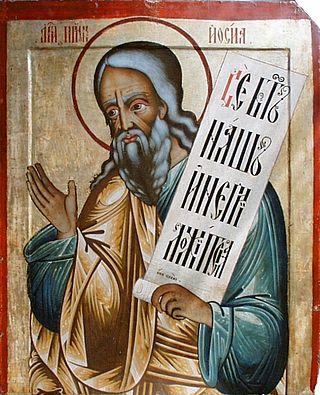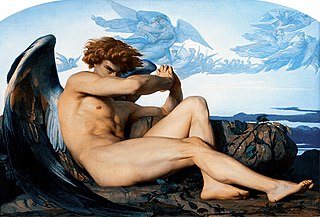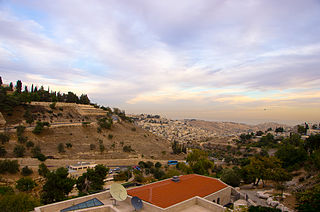Related Research Articles

Heaven, or the heavens, is a common religious cosmological or transcendent supernatural place where beings such as deities, angels, souls, saints, or venerated ancestors are said to originate, be enthroned, or reside. According to the beliefs of some religions, heavenly beings can descend to Earth or incarnate and earthly beings can ascend to Heaven in the afterlife or, in exceptional cases, enter Heaven without dying.

In the Hebrew Bible, Hosea, also known as Osee, son of Beeri, was an 8th-century BCE prophet in Israel and the nominal primary author of the Book of Hosea. He is the first of the Twelve Minor Prophets, whose collective writings were aggregated and organized into a single book in the Jewish Tanakh by the Second Temple period but which are distinguished as individual books in Christianity. Hosea is often seen as a "prophet of doom", but underneath his message of destruction is a promise of restoration. The Talmud claims that he was the greatest prophet of his generation. The period of Hosea's ministry extended to some sixty years, and he was the only prophet of Israel of his time who left any written prophecy. Though its date is contested among scholars, the majority agree that the bulk of the book was probably composed around the times of Jeroboam II of Israel.

The most common meaning for Lucifer in English is as a name for the Devil in Christian theology. It appeared in the King James Version of the Bible in Isaiah and before that in the Vulgate, not as the name of a devil but as the Latin word lucifer (uncapitalized), meaning "the morning star", "the planet Venus", or, as an adjective, "light-bringing". It is a translation of the Hebrew word הֵילֵל, hêlēl, meaning "Shining One".

Baal, or Baʻal, was a title and honorific meaning 'owner' or 'lord' in the Northwest Semitic languages spoken in the Levant during antiquity. From its use among people, it came to be applied to gods. Scholars previously associated the theonym with solar cults and with a variety of unrelated patron deities, but inscriptions have shown that the name Ba'al was particularly associated with the storm and fertility god Hadad and his local manifestations.
Rimmon or Rimon is a Hebrew word meaning 'pomegranate'. It appears as a name in the Hebrew Bible where, when translated to Greek, it takes the form Remmon Ρεμμων, Remmōn).

Mesopotamian religion refers to the religious beliefs and practices of the civilizations of ancient Mesopotamia, particularly Sumer, Akkad, Assyria and Babylonia between circa 6000 BC and 400 AD. The religious development of Mesopotamia and Mesopotamian culture in general, especially in the south, were not particularly influenced by the movements of the various peoples into and throughout the area. Rather, Mesopotamian religion was a consistent and coherent tradition, which adapted to the internal needs of its adherents over millennia of development.

Moloch, Molech, or Molek is a word which appears in the Hebrew Bible several times, primarily in the Book of Leviticus. The Bible strongly condemns practices that are associated with Moloch, which are heavily implied to include child sacrifice.
Demonization or demonisation is the reinterpretation of polytheistic deities as evil, lying demons by other religions, generally by the monotheistic and henotheistic ones. The term has since been expanded to refer to any characterization of individuals, groups, or political bodies as evil.
A tutelary is a deity or a spirit who is a guardian, patron, or protector of a particular place, geographic feature, person, lineage, nation, culture, or occupation. The etymology of "tutelary" expresses the concept of safety and thus of guardianship.
Monolatry is the belief in the existence of many gods, but with the consistent worship of only one deity. The term monolatry was perhaps first used by Julius Wellhausen.

In Akkadian mythology the Rabisu, or possibly Rabasa, are vampiric spirits, daimons, or demons. The Rabisu are associated in mythology with the Curse of Akkad. A consistent translation of "Rabisu" is “Lingerers”. The Rabisu, whether intending malicious actions or not, linger around those who have been found wayward or to be rewarded by the deity Enlil.

Elohim, the plural of אֱלוֹהַּ, is a Hebrew word meaning "gods" or "godhood". Although the word is grammatically plural, in the Hebrew Bible it most often takes singular verbal or pronominal agreement and refers to a single deity, particularly the God of Israel. In other verses it refers to the singular gods of other nations or to deities in the plural.

Nabu is the Babylonian patron god of literacy, the rational arts, scribes, and wisdom. He is associated with the classical planet Mercury in Babylonian astronomy.

Canaanite religion was a group of ancient Semitic religions practiced by the Canaanites living in the ancient Levant from at least the early Bronze Age to the first centuries CE. Canaanite religion was polytheistic and in some cases monolatristic. It was influenced by neighboring cultures, particularly ancient Egyptian and Mesopotamian religious practices. The pantheon was headed by the god El and his consort Asherah, with other significant deities including Baal, Anat, Astarte, and Mot.
Sons of God is a phrase which is used in the Tanakh or the Old Testament as well as in Christian Apocrypha. The phrase is also used in Kabbalah where the bene elohim are part of different Jewish angelic hierarchies.
Baʿal Berith and El Berith are titles of a god or gods worshiped in Shechem, in ancient Canaan, according to the Bible.
A cup-bearer was historically an officer of high rank in royal courts, whose duty was to pour and serve the drinks at the royal table. On account of the constant fear of plots and intrigues, a person had to be regarded as thoroughly trustworthy to hold the position. He would guard against poison in the king's cup, and was sometimes required to swallow some of the drink before serving it. His confidential relations with the king often gave him a position of great influence.

Beelzebub or Baʿal Zebub, also spelled Beelzebul or Belzebuth, and occasionally known as the Lord of the Flies, is a name derived from a Philistine god, formerly worshipped in Ekron. In some Abrahamic religions he is described as a major demon. The name Beelzebub is associated with the Canaanite god Baal.

The Valley of Hinnom, Gehinnom or Gehenna, also known as Wadi el-Rababa, is a historic valley surrounding Jerusalem from the west and southwest that has acquired various theological connotations, including as a place of divine punishment, in Jewish eschatology.

"Thou shalt not make unto thee any graven image" is an abbreviated form of one of the Ten Commandments which, according to the Book of Deuteronomy, were spoken by God to the Israelites and then written on stone tablets by the Finger of God. It continues, "... any graven image, or any likeness [of any thing] that [is] in heaven above, or that [is] in the earth beneath, or that [is] in the water under earth: Thou shalt not bow down thyself to them, nor serve them."